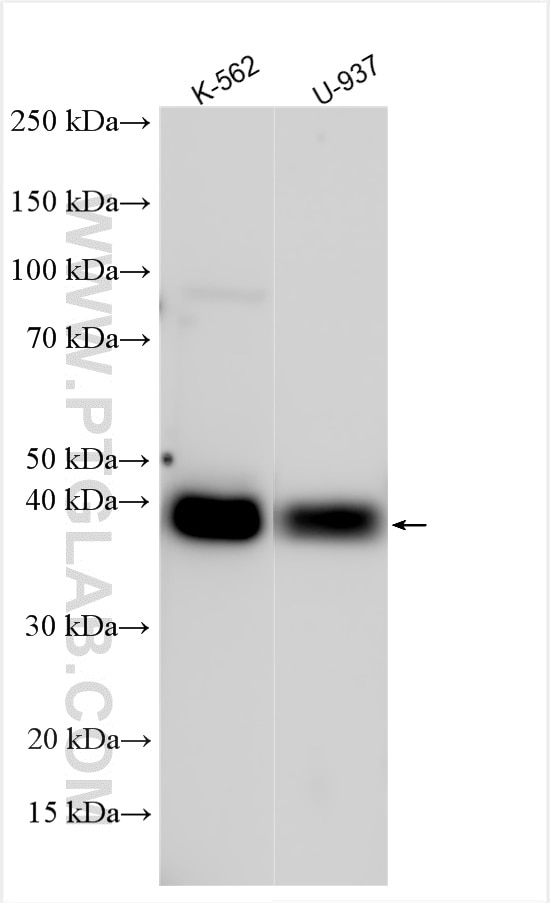CD32A/C Polyclonal antibody
CD32A/C Polyclonal Antibody for WB, ELISA
Host / Isotype
Rabbit / IgG
Reactivity
human
Applications
WB, ELISA
Conjugate
Unconjugated
Cat no : 25323-1-AP
Synonyms
Validation Data Gallery
Tested Applications
| Positive WB detected in | K-562 cells, U-937 cells |
Recommended dilution
| Application | Dilution |
|---|---|
| Western Blot (WB) | WB : 1:1000-1:6000 |
| It is recommended that this reagent should be titrated in each testing system to obtain optimal results. | |
| Sample-dependent, Check data in validation data gallery. | |
Product Information
25323-1-AP targets CD32A/C in WB, ELISA applications and shows reactivity with human samples.
| Tested Reactivity | human |
| Host / Isotype | Rabbit / IgG |
| Class | Polyclonal |
| Type | Antibody |
| Immunogen | CD32A/C fusion protein Ag18123 |
| Full Name | Fc fragment of IgG, low affinity IIc, receptor for (CD32) |
| Calculated Molecular Weight | 323 aa, 36 kDa |
| Observed Molecular Weight | 40 kDa |
| GenBank Accession Number | BC137397 |
| Gene Symbol | FCGR2C |
| Gene ID (NCBI) | 9103 |
| Conjugate | Unconjugated |
| Form | Liquid |
| Purification Method | Antigen affinity purification |
| Storage Buffer | PBS with 0.02% sodium azide and 50% glycerol pH 7.3. |
| Storage Conditions | Store at -20°C. Stable for one year after shipment. Aliquoting is unnecessary for -20oC storage. 20ul sizes contain 0.1% BSA. |
Background Information
IgG Fc receptors (FcγRs) play important roles in immune responses. The low-affinity IgG Fc receptor, FcγRII (CD32), consists of a family of primarily cell membrane receptor proteins: CD32A, CD32B, and CD32C. They are encoded by the mRNA splice variants of three highly related genes: FCGR2A, FCGR2B, and FCGR2C (PMID: 30941127). CD32 is present on phagocytic cells such as macrophages and neutrophils, and is involved in the process of phagocytosis and clearing of immune complexes. This antibody raised against 254-323 aa of human CD32C (FCGR2C) can recognize both CD32A and CD32C forms.
Protocols
| Product Specific Protocols | |
|---|---|
| WB protocol for CD32A/C antibody 25323-1-AP | Download protocol |
| Standard Protocols | |
|---|---|
| Click here to view our Standard Protocols |


